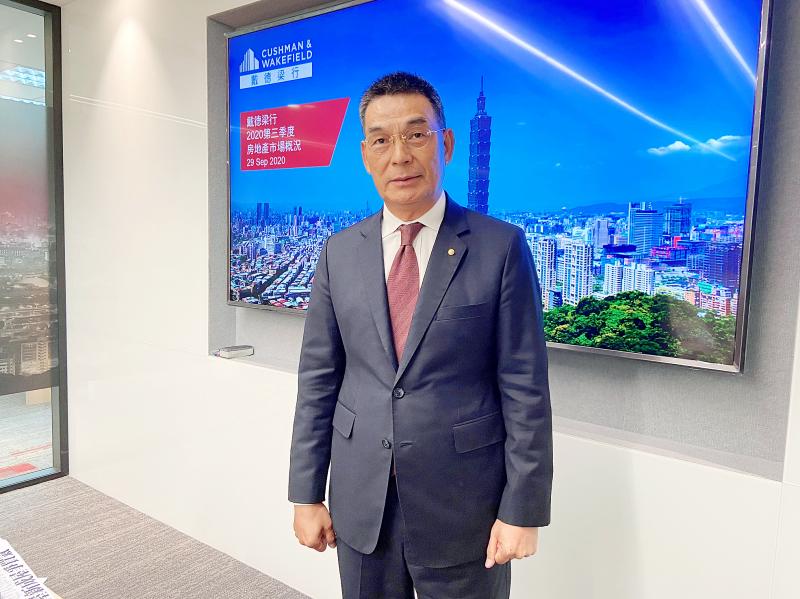Commercial property transactions totaled NT$67.64 billion (US$2.32 billion) in the July-to-September quarter, more than doubling from the previous quarter and a year earlier, driven by self-occupancy and investment demand from local technology and insurance companies, Cushman & Wakefield Taiwan (戴德梁行) said yesterday.
Local capital drove all of the deals, of which 72 percent were concentrated in Taipei, Taoyuan and Tainan, Cushman & Wakefield said.
Fubon Life Insurance Co (富邦人壽), the main subsidiary of Fubon Financial Holding Co (富邦金控), acquired Sunworld Dynasty Hotel Taipei (王朝大酒店) near the Taipei Arena MRT Station for NT$25.52 billion, the property consultancy said.

Photo: Hsu Yi-ping, Taipei Times
The transaction came with an agreement from the property’s US owner, Sunrider International, to lease the complex to keep the hotel going and generate rent income for Fubon Life.
Taiwan Semiconductor Manufacturing Co (TSMC, 台積電), the world’s largest contract chipmaker, bought three factories in Tainan for NT$9.35 billion to meet capacity expansion needs, Cushman & Wakefield said.
Adding another purchase of NT$660 million last quarter, TSMC poured more than NT$10 billion into the commercial property market, becoming a major contributor, it said.
Sales of partial floors at an office building in Taipei’s prime Xinyi District (信義) above the Taipei City Hall MRT Station surprised the market with a record price of nearly NT$1.8 million per ping (3.3m2), Cushman & Wakefield said.
Chiayi-based Ying Chan Development Co (營展開發) bought the entire 16th floor for NT$1.24 billion and affiliated Ying Fu Development Co (盈福開發) purchased part of the 29th floor for NT$650 million one month apart, it said.
The transactions showed that prices for grade-A office space in the district are approaching that for luxury residential apartments, the most expensive property products in Taiwan, due to strong demand and scarce supply, Cushman & Wakefield said.
The housing market also recovered from the COVID-19 pandemic judging by transaction volumes and prices, Cushman & Wakefield Taiwan general manager Billy Yen (顏炳立) said.
Yen attributed the fast recovery to accommodative monetary policy in Taiwan and around the world.
Presale projects proved the most popular, as they were priced at roughly the same levels as existing homes, Yen said, calling the phenomenon unreasonable.
Existing homes should be sold at discount rates relative to presale and new housing projects, he said.
Yen hesitated to bet on a sustained recovery that is modest in scale for the time being.

GROWING OWINGS: While Luxembourg and China swapped the top three spots, the US continued to be the largest exposure for Taiwan for the 41st consecutive quarter The US remained the largest debtor nation to Taiwan’s banking sector for the 41st consecutive quarter at the end of September, after local banks’ exposure to the US market rose more than 2 percent from three months earlier, the central bank said. Exposure to the US increased to US$198.896 billion, up US$4.026 billion, or 2.07 percent, from US$194.87 billion in the previous quarter, data released by the central bank showed on Friday. Of the increase, about US$1.4 billion came from banks’ investments in securitized products and interbank loans in the US, while another US$2.6 billion stemmed from trust assets, including mutual funds,

AI TALENT: No financial details were released about the deal, in which top Groq executives, including its CEO, would join Nvidia to help advance the technology Nvidia Corp has agreed to a licensing deal with artificial intelligence (AI) start-up Groq, furthering its investments in companies connected to the AI boom and gaining the right to add a new type of technology to its products. The world’s largest publicly traded company has paid for the right to use Groq’s technology and is to integrate its chip design into future products. Some of the start-up’s executives are leaving to join Nvidia to help with that effort, the companies said. Groq would continue as an independent company with a new chief executive, it said on Wednesday in a post on its Web

JOINT EFFORTS: MediaTek would partner with Denso to develop custom chips to support the car-part specialist company’s driver-assist systems in an expanding market MediaTek Inc (聯發科), the world’s largest mobile phone chip designer, yesterday said it is working closely with Japan’s Denso Corp to build a custom automotive system-on-chip (SoC) solution tailored for advanced driver-assistance systems and cockpit systems, adding another customer to its new application-specific IC (ASIC) business. This effort merges Denso’s automotive-grade safety expertise and deep vehicle integration with MediaTek’s technologies cultivated through the development of Media- Tek’s Dimensity AX, leveraging efficient, high-performance SoCs and artificial intelligence (AI) capabilities to offer a scalable, production-ready platform for next-generation driver assistance, the company said in a statement yesterday. “Through this collaboration, we are bringing two

Even as the US is embarked on a bitter rivalry with China over the deployment of artificial intelligence (AI), Chinese technology is quietly making inroads into the US market. Despite considerable geopolitical tensions, Chinese open-source AI models are winning over a growing number of programmers and companies in the US. These are different from the closed generative AI models that have become household names — ChatGPT-maker OpenAI or Google’s Gemini — whose inner workings are fiercely protected. In contrast, “open” models offered by many Chinese rivals, from Alibaba (阿里巴巴) to DeepSeek (深度求索), allow programmers to customize parts of the software to suit their